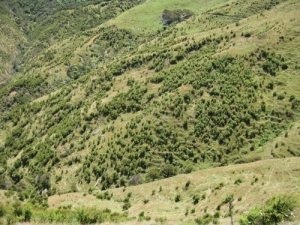Waikato dairy effluent breaches lead to $108,000 in fines
Two farmers and two farming companies were recently convicted and fined a total of $108,000 for environmental offending.
 An example of manuka plantings which could be undertaken to aid natural reversion to stabilise land.
An example of manuka plantings which could be undertaken to aid natural reversion to stabilise land.
Protect your land and take up a buzzing opportunity to earn extra cash.
That's the possibility for landowners in two erosion-prone Waipa river catchments. They are being alerted to the potential to stem erosion on their land and add to farm income by producing prestige manuka honey.
Under a new scheme, involving funding from the Waikato River Authority and Waikato Regional Council, landowners can apply for up to 70% of the cost of planting and associated fencing to stabilise steep slopes in the Kaniwhaniwha and Moakurarua stream catchments. This type of planting helps protect water quality from the effects of sediment and excessive nutrients.
The grant is available for planting various types of tree but the council says one option is for landowners to work with honey companies to make the land available for planting manuka and producing premium manuka honey. This type of arrangement between landowners and honey companies is already happening in other parts of the Waikato and elsewhere in New Zealand.
The council's Waipa zone manager Grant Blackie said such deals could help ensure the health of waterways was better protected and provide a new revenue source to help improve, for example, farm resilience.
"A recent study said that many thousands of hectares of erodible land in the Waipa catchment need to be planted with woody vegetation to help deliver on the Crown-iwi Vision and Strategy for river health.
"The funding for planting provided by the regional council and the Waikato River Authority, and the potential for profitable partnerships with honey companies, will be an incentive for landowners to make the switch," says Blackie.
Farmers and others interested in potential manuka planting could also consider attending a one day event on this topic in Hawera on February 17. Details are available at:
Agriculture and Forestry Minister Todd McClay is encouraging farmers and growers to stay up to date with weather warnings and seek support should they need it.
The closure of SH2 Waioweka Gorge could result in significant delays and additional costs for freight customers around the Upper North Island, says Transporting New Zealand.
OPINION: The year has started positively for New Zealand dairy farmers and things are likely to get better.
Ministry for Primary Industries (MPI) Director General Ray Smith believes there is potential for an increase in dairy farming in New Zealand.
New Zealand's new Special Agricultural Trade Envoy, Horowhenua dairy farmer, company director and former Minister of Agriculture, Nathan Guy says the Free Trade Agreement (FTA) with India is a good deal for the country.
New figures show dairy farmers are not only holding on to their international workforce, but are also supporting those staff to step into higher-skilled roles on farm.

OPINION: If the hand-wringing, cravat and bow-tie wearing commentariat of a left-leaning persuasion had any influence on global markets, we'd…
OPINION: With Winston Peters playing politics with the PM's Indian FTA, all eyes will be on Labour who have the…